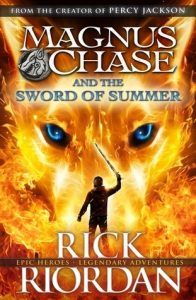 I started Magnus Chase and the Sword of Summer by Rick Riordan before Christmas, but when I was around half-way through Queer Lit Readathon week started, and I put it down to focus on that reading list and have been slow to pick it up again. By now the library are getting quite keen to have their copy back, so I decided to make time to finish it, and I’m rather glad I did.
I started Magnus Chase and the Sword of Summer by Rick Riordan before Christmas, but when I was around half-way through Queer Lit Readathon week started, and I put it down to focus on that reading list and have been slow to pick it up again. By now the library are getting quite keen to have their copy back, so I decided to make time to finish it, and I’m rather glad I did.
Like the Percy Jackson series, the main charm (for me) in Magnus Chase is the intertwining of mythology and contemporary life (and technology). The old Gods don’t go away just because people stop believing in them, but they change – to some extent – with the changing humans. Riordan extracts a lot of humour from the juxtapostion of old and new, mythology and reality, and I readily admit to laughing out loud several times. Some of the jokes are clearly geared towards an older audience, such as Ran’s husband Aegir going full hipster:
‘Aegir.’ Ran spat. ‘The great stirrer of sea storms! These days the only thing he wants to do is brew his mead. He’s _always_ been a brewer, but lately it’s ridiculous. He spends all his time at the hops shop, or going on brewery tours with his buddies. And don’t get me started on the flannel shirt, rolled-up skinny jeans, glasses and the way he trims his beard. He’s always talking about microbrews. He has a cauldron a mile wide! How can he _microbrew_?’
(Page 235.) Being fairly familiar with the microbrew-world myself I can easily imagine a Norse God as part of the culture (or cult).
Other guffaw-worthy moments are more likely to also work for the target audience:
Junior glowered at me. ‘Boy, your ignorance is breathtaking. Gleipnir was just as thin and light, but its paradox ingredients gave it great strength. This rope is the same, only better!’
‘Paradox ingredients?’
Blitz held up the end of the rope and whistled appreciatively. ‘He means things that aren’t supposed to exist. Paradox ingredients are very difficult to craft with, very dangerous. Gelipnir contained the footfall of a cat, the spittle of a bird, the breath of a fish, the beard of a woman.’
‘Dunno if that last one is a paradox,’ I said. ‘Crazy Alice in Chinatown has a pretty good beard.’
Junior huffed. ‘The point is, this rope is even better! I call it Andskoti, the Adversary. It is woven with the most powerful paradoxes in the Nine Worlds – Wi-Fi with no lag, a politician’s sincerity, a printer that prints, healthy deep-fried food and an interesting grammar lecture!’
‘Okay, yeah,’ I admitted. ‘Those things don’t exist.’
(Page 319-320.) Apart from the fun bits of playing around with mythology, Magnus Chase is a classic underdog and his rag-tag band saves the world kind of story, but with a clever enough plot that it doesn’t feel old and stale. Other themes are outsider (or freak) identity and found family (the latter being one of my soft spots).
It’s been so long since I read Percy Jackson and the Lightning Thief (and no, I still haven’t read the rest of the series) that it was only when I reread my own blogpost about it that I realised there might be a link between the two stories, Percy’s friend being called Annabeth, the same as Magnus’ cousin. Surely that can’t be a coincidence?
My main niggle with Percy Jackson was caused by comparison to other books, mainly the boy who lived. But with the author of the latter having gone full transphobe in the years since I wrote that, I must admit that I am inclined to look at other stories in a more friendly light. I’m pretty sure I’ll be getting the next Magnus Chase book out of the library this summer, and I might even give Percy another go. I have also noted that it is really time I read Neil Gamain’s Norse Mythology (which we own).
I’ll finish with another of my lol-moments:
The goat plodded over. ‘You really should take better care of your elf. They need lots of sunchine – not this weak Jotunheim light. And you can’t overwater them by drowning them in rivers.’
(Page 340.)
Boka har jeg lånt på Trondheim Folkebibliotek.